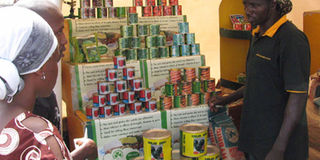Beware of fake agro-inputs

Farmers are advised to buy seed and other farm inputs only from genuine stockists, or reputable seed companies and suppliers. PHOTO BY MICHAEL J. SSALI
What you need to know:
According to statistics, 15 to 20 per cent of annual trade of agriculture chemicals is affected by counterfeits. The value is estimated to be $6m (about Shs1b) of the national agrichemical business.
With the increasing global warming and its effects being felt closer at home, farmers’ crops are not only drying from the scorching sun, the farmers are also spending more on buying agro-inputs.
In their quest for more productivity, many farmers will become more vulnerable to unscrupulous traders who deal in counterfeit farm-inputs including seeds, fertilisers, vet-drugs and agrochemicals among other.
Counterfeits are usually imitations of another well-known product with an intention of deceiving the customer. Some counterfeit products are sold at prices equivalent to the genuine products, while others are extremely cheap. Mr Abdu Kafuma, bought two packets of herbicide and used them to spray weeds in preparation for a new season, but the wild-plants did not dry up.
“I bought the herbicide at a subsidised fee at Container Village after a dealer assured me that it was the genuine drug I asked for,” Mr Kafuma lamented adding, “I applied the herbicide to the weeds, but they (weeds) refused to dry up.
“I sprayed them for the second time using a higher dosage, but again the drug refused to work,” Kafuma said.
According to Dr Rita Laker-Ojok, the executive director of AT Uganda, many farmers often buy a range of counterfeit or adulterated agro-input.
She says, in case of seeds, it may be expired or simply coated with related colours to deceive farmers yet have poor or low germination rates.
“Expired or diluted fertilisers may have poor action and dangerous residual risking human life, increased food insecurity due to low performance, high cost of production and long term environment degradation consequences,” Dr Laker-Ojok says.
According to Mr Frank Twinmatsiko of ATU, the trend of counterfeiting agriculture chemical products in the country is worrying. The sort and number of counterfeit products are growing with huge vale, he says.
According to statistics, 15 to 20 per cent of annual trade of agriculture chemicals is affected by counterfeits. The value is estimated to be $6m (about Shs1b) of the national agrichemical business.
Mr Twinmatsiko says some of those products contain anything from water, paraffin, soil, diluted and outdated or obsolete pesticides stocks, including banned or restricted chemicals.
“Counterfeits are becoming more foxy and rampant discouraging honest dealers from investing in product and market development,” he says.
According to statistics from Uganda Manufactures Association, manufactures lose billions of shillings to counterfeits annually.
UMA says the scourge is wide-ranging and it ranges from food processing to plastics and pharmaceuticals.
The seed industry in Uganda is purely private sector driven and governed by a seed legislation known as the Seed and Plant Act, 2006.
The act provides for the promotion, regulation and control of plant breeding and variety release, multiplication, conditioning, marketing, export or import and quality assurance of seeds and other planting materials.
Mr Fred Kabuye says though institutions mandated to check the quality of seeds try scrutinise, not all defects in seeds can be seen during field inspection because seed testing is done on a sample in laboratory against the various attributes as specified in the certificate standards
Mr Wilfred Thembo of the Uganda National Agro-inputs Association (Unada) says the law requires all categories of seed stakeholders including seed producers, processors, dealers, exporters and imports to be registered and licensed, but many operate illegally.
“Many seed dealers take chance of lack of adequate enforcement of existing laws and regulation regarding seeds and agriculture chemicals as well as weak punitive measures,” Mr Thembo says.
Ms Laker-Ojok says in order to increase food security and household income there is indeed an urgent need to protect the farming community from being misled with counterfeit.
She advises farmers to buy seed and other farm inputs only from known genuine stockists in sealed packages from reputable seed companies and suppliers.




